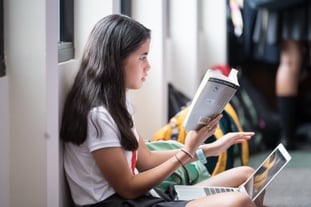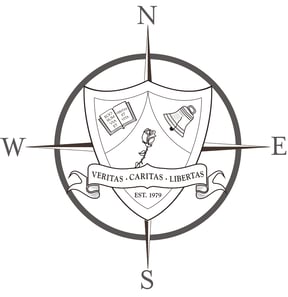Some say it strikes like lightning: that spark that sets the mind on fire and ignites the spirit. We grasp it in an instant and recognize it despite its ever changing form, in the capture of a scream on canvas, our country’s origin story told in rap, or the wordless story expressed in an animated short film. It has directed humanity’s course, both in ancient times and present day. With it, our ancestors made sense of the stars; our contemporaries plan a pathway to Mars.
Imagination. 
We owe our history to it and bank our future on it. But where does it come from? How do we cultivate it? And why is it important for students?
For 21st century learners, these questions are more important than ever. An ever-connected and information-dense world can choke the creative pipeline, snuffing curiosity and extinguishing imagination. When answers precede questions, there is little room for developing habits of wonder, awe and reflection. In effect, we risk our stories being written for us.
But human beings, and our history, rely on imagination. In fact, some, like historian Yuval Noah Harari, author of Sapiens: A Brief History of Humankind, argue that imagination is what defines us as a species. According to Harari, it was imagination — the ability to conceptualize communities larger than our own and envision ways to cooperate — that enabled our species’ survival and set us apart from other primates. Not only does imagination form the identities of individuals and communities, it allows us to conjure a vision of the future and set a path to realizing it. This is why strong examples of the power of imagination are so important for students today, so they may develop the habits they need to see a world beyond what the world lays before them.
Grade 6 Literature at Montrose centers on the theme of imagination. The eponymous heroine in Anne of Green Gables, a novel studied in class, presents a powerful example not only of imagination, but also of the will to imagine, even in tough times. Though she believes she will be sent away from Green Gables (what looks like paradise to her) and back to the dreaded orphanage she came from, Anne is determined not to let that perceived outcome affect her:
“Do you know,” said Anne confidentially, “I’ve made up my mind to enjoy this drive. It’s been my experience that you can nearly always enjoy things if you make up your mind firmly that you will. Of course, you must make it up firmly. I am not going to think about going back to the asylum while we’re having our drive. I’m just going to think about the drive. Oh, look, there’s one little early wild rose out! Isn’t it lovely?”
In fact, Anne bets her life on her imagination, and it saves her. As an orphan she envisions a world and a make-believe friend that sustain her until she finds her adoptive family. Her imagination allows her to relish the unknown, seeing in a world that needs discovering, an adventure of possibility:
“Isn't it splendid to think of all the things there are to find out about? It just makes me feel glad to be alive —it's such an interesting world. It wouldn't be half so interesting if we know all about everything, would it? There'd be no scope for imagination then, would there?”
In another sixth grade text, The Secret Garden, orphan Mary Lennox sees her imagination awakened in her mysterious uncle’s quiet, vacant mansion, where she has been sent to live after her parents’ deaths in India. Uprooted from a coddled existence, where her every whim and fancy is quenched almost before it begins, and thrust into a cold, unfeeling estate, Mary must build the empty chambers of her own heart and mind, and in the process, create the person she truly wants to be:
“Living as it were, all by herself in a house with a hundred mysteriously closed rooms and having nothing whatever to do to amuse herself, had set her inactive brain to working and was actually awakening her imagination.”
For both Anne and Mary, imagination is not only a whim or fancy, but also a means to survival. The cultivated imagination amounts to the cultivated self. But can the imagination do in the real world what it does in fiction?
Montrose seniors in Modern Literature read Left to Tell, the agonizing and gripping memoir of Immaculee Ilibagiza, whose family is victim to the Rwandan genocide. Her vivid account of the atrocities she suffers stabs sharply at the reader’s soul, but just as acute is her testimony to the power of faith, hope, and an imagined future. While hiding in a bathroom with seven other women, Immaculee passes the terrorizing time by praying and imagining, first imagining her family in heaven and then imagining the life she wishes to live after the war. She describes two times when she imagines herself into a job at the United Nations, the second time going so far as to imagining the phone number she will have when she works there. Both times, her dreams become reality. She writes,
“I was living proof of the power of prayer and positive thinking, which really are almost the same thing. God is the source of all positive energy, and prayer is the best way to tap into his power.”
The world hands today’s students a lot to carry. From the pandemic to unrest, students are bombarded with visions of hard realities. And while it is important for students to come to terms with the reality around them, it is equally important that they see the power their imaginations can have on outcomes — in their own lives and in the world. Whether they need to escape like Anne, grow like Mary, or dream their lives into reality like Immaculee, there is always “scope for the imagination,” if students know where to look. And as both history and Anne Shirley inspire us, “It's delightful when your imaginations come true, isn't it?”





